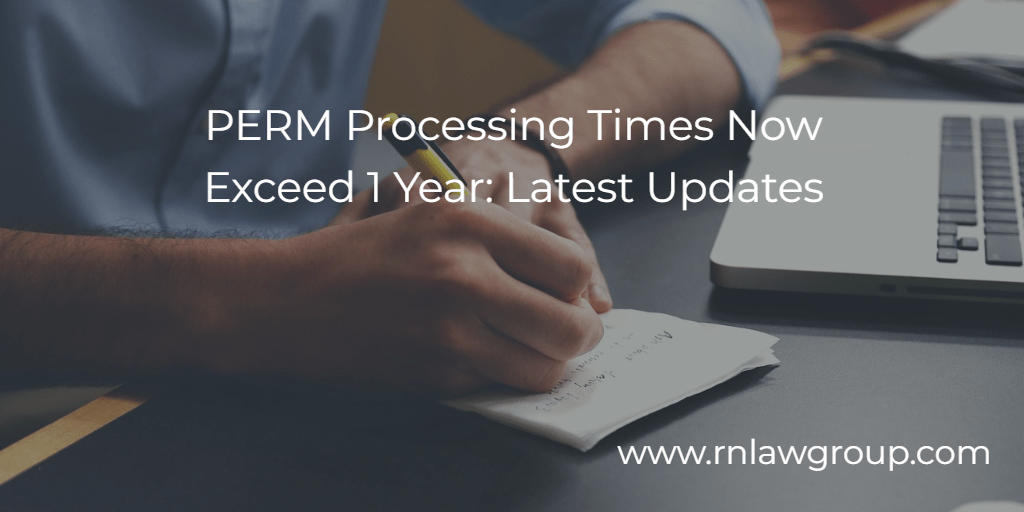
PERM Processing Times Now Exceed 1 Year: Latest Updates
The Department of Labor (DOL) has recently updated the processing times for both PERM applications (also referred to as ETA Form 9089) and prevailing wage determination (PWD) requests as of January 31, 2024. This latest data sheds light on the current pace of processing for these crucial components of the employment-based immigration process, serving as a vital resource for employers and foreign workers navigating the complex landscape of PERM labor certification.
Regarding prevailing wage determinations, the National Prevailing Wage Center (NPWC) is currently processing PWDs filed in July 2023, which indicates about 7 months to process. Note that the DOL has mistakenly indicated that they are processing PWDs filed in July 2024, which would be impossible as this is a future date. If you went to the FLAG website and were confused, it is safe to assume DOL meant July 2023. Further, the DOL is processing PWDs for non-OES wage requests submitted in February 2023, including those based on private wage surveys. Additionally, redetermination requests submitted in June 2023 are being processed by the NPWC. Currently at Reddy Neumann Brown PC, we are seeing prevailing wage determinations being issued in approximately 6 months.
For PERM processing times, the DOL is currently working on applications filed in January 2023 or earlier, with an average adjudication time of around 393 days (over 1 year). This is up about 30 days from the previous report the DOL made available. Furthermore, audits for PERM applications filed in December 2022 are being processed, with an average review time of 480 days. Consequently, if a PERM application undergoes an audit, an additional 3 months should be expected for adjudication, for a total of approximately 16 months from the filing of the initial application. Additionally, reconsideration requests for PERM applications submitted in March 2023 are being processed by the DOL. Presently, at Reddy Neumann Brown PC, PERM applications are typically being approved in approximately 12 to 13 months if not audited, aligning with the average processing times provided by the DOL.
Over the past few years, there has been a significant increase in processing times for PERM applications and PWDs, and unfortunately, there are no signs of improvement in the foreseeable future. During the annual immigration law conference hosted by the Practising Law Institute (PLI) on November 28, 2023, officials from the DOL’s Office of Foreign Labor Certification (OFLC) provided updates on the status of PERM processing. As of September 23, 2023, the DOL had approximately 71,000 pending cases within the former PERM system, while the current FLAG system, which began handling all PERM submissions as of June 1st, had 79,376 pending cases. The DOL indicated that a combination of increased workload, inadequate funding, and inflation are to blame for poor processing times. Even further, DOL reported that they have to reallocate resources from the PERM program to the H-2A and H-2B programs to meet regulatory deadlines.
Further, the DOL implemented a new ETA Form 9089 and filing system in 2023, which may lead to additional delays. The implementation of the new form was not seamless and there are still aspects of the form that are not 100% clear. We are also witnessing an increase in Requests for Further Information (RFI) on PWDs. An RFI can be issued for multiple reasons, but essentially the DOL needs additional information regarding the job in order to accurately assign a wage determination. Many of the issued RFIs are frivolous and this is problematic because it will typically take an additional 3 weeks for the DOL to issue a wage determination after the RFI response has been submitted by the employer. Yet another significant concern regarding the RFI process is the limited timeframe provided by the DOL, allowing employers or their legal representative only 7 days to respond. This places considerable pressure on employers, particularly when faced with multiple RFIs.
Given the combination of increased workload, inadequate funding, and the new filing system, improvements in PERM processing times are unlikely in the near future. Extremely long processing times for both prevailing wage determinations and PERM applications present significant challenges for employers and foreign workers alike. Staying informed about these processing times is essential for employers and employees to plan ahead. Employers should initiate the employment-based green card process as early as possible to mitigate issues with temporary work visa status and the ability of foreign workers to continue working in the U.S. Moreover, individuals who qualify may explore alternative options such as EB-1A for Extraordinary Ability and the National Interest Waiver, which bypass the PERM labor certification process and do not require a job offer.
At Reddy Neumann Brown PC, our dedication to our clients extends beyond mere assistance; we are fully committed to guiding our clients through the complexities of the PERM labor certification process, particularly in light of the challenges stemming from extended processing times. Recognizing the negative impact that PERM delays can have on businesses and their employees, our litigation team has taken decisive action by filing a lawsuit aimed at holding the Department of Labor DOL accountable for these delays. Through strategic legal advocacy, we seek to compel the DOL to address the root causes of inefficiency within the PERM processing system, ultimately striving for a more streamlined and expeditious process that serves the interests of all stakeholders involved. For more information on our lawsuit, visit: https://www.youtube.com/watch?v=izjgEnNbdkw.
Reddy Neumann Brown PC opened its doors over 25 years ago with the aim of offering prompt, practical, and professional legal services to companies seeking to recruit top talent and foreign workers aspiring to establish careers in the United States. Our team remains fully dedicated to providing our clients with the tools needed to navigate the complex business immigration landscape. If you have any inquiries, please schedule a consultation with one of our immigration attorneys at https://appointments.rnlawgroup.com/.
Krystal Alanis is a Partner at Reddy Neumann Brown PC with over 10 years of experience practicing U.S. business immigration law. Krystal manages the firm’s PERM Labor Certification Department, where she oversees all EB-2 and EB-3 employment-based green card matters. Krystal guides clients from a variety of industries through the maze of the PERM Labor certification process and has handled thousands of PERM applications throughout her career. Krystal guides employers through the I-140 and Adjustment of Status process, and assists clients with temporary work visas. Further, she oversees the firm’s I-9 compliance team where she advises employers regarding Form I-9 Employment Eligibility Verification requirements and conducts internal audits of a company’s I-9 records, processes, and procedures. Additionally, Krystal represents clients in Form I-9 U.S. Immigration and Customs Enforcement (ICE) inspections (Notice of Inspection). Krystal successfully settled a claim with ICE over Form I-9 substantive paperwork violations that led to an 88% reduction in civil fines for her client.

